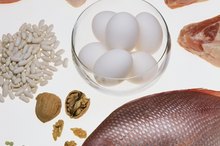What does fact checked mean?
At Healthfully, we strive to deliver objective content that is accurate and up-to-date. Our team periodically reviews articles in order to ensure content quality. The sources cited below consist of evidence from peer-reviewed journals, prominent medical organizations, academic associations, and government data.
The information contained on this site is for informational purposes only, and should not be used as a substitute for the advice of a professional health care provider. Please check with the appropriate physician regarding health questions and concerns. Although we strive to deliver accurate and up-to-date information, no guarantee to that effect is made.
Why Are the Protein Diets of Children Different From Adults?
Proteins are important building blocks of all the cells in the body. Protein provides the raw materials the body needs to develop and function. Dietary requirements for protein are affected by many factors, including age and growth. Younger children especially need more protein than adults because their bodies are still growing.
Amount of Protein Relative to Body Weight
Protein needs are proportional. If you compare the amount of protein needed as a percentage of body weight, children need a greater amount of protein relative to their body weight. The average adult needs about 0.6 to 0.8 grams of protein per kilogram of body weight. Infants may need almost double that amount, as much as 2 grams per kilogram. An average adult needs about 50 grams of protein per day, depending on gender and size, whereas infants need only about 11 to 13 grams.
- Protein needs are proportional.
- The average adult needs about 0.6 to 0.8 grams of protein per kilogram of body weight.
Feeding and Infant
The Dosage of an Iron Supplement for a 2-Year-Old
Learn More
A baby’s first year of life is a period of rapid growth -- most babies double their body weight before they are even six months old. The number of calories needed per pound of body weight are higher during the first year of life than at any other time. All infants will meet their dietary protein requirements from adequate intake of breastmilk or formula. The Pediatric Nutrition Handbook published by the American Academy of Pediatrics (AAP) states that the best food for full-term infants is human milk 1. Although human milk contains less protein than infant formulas, “human milk proteins have a high nutritional quality and are digested and absorbed more efficiently than cow milk proteins.”
- A baby’s first year of life is a period of rapid growth -- most babies double their body weight before they are even six months old.
- The Pediatric Nutrition Handbook published by the American Academy of Pediatrics (AAP) states that the best food for full-term infants is human milk 1.
Feeding Your Child
According to the AAP, the amount of protein required for preschool and school-aged children is less than infants relative to body weight. They still have a slightly higher requirement than adults because of growth. Healthy 1 to 3 year old children require 0.55 grams of protein per pound of body weight per day. Children between the ages of 4 and 13 need approximately 0.46 grams of protein per pound of body weight per day. Between the ages of 1 and 3, protein should comprise between 5 and 20 percent of a child's dietary intake. Between ages 4 and 18, this increases to between 10 and 30 percent.
- According to the AAP, the amount of protein required for preschool and school-aged children is less than infants relative to body weight.
- Children between the ages of 4 and 13 need approximately 0.46 grams of protein per pound of body weight per day.
When Children Need Even More Protein
USDA Recommendations of Protein in Diet
Learn More
Some children may require more protein because of increased energy requirements. For example, children with chronic infections, physical injury or medical conditions need more protein. Children who have been previously malnourished and are undergoing catch-up growth also need more protein. Athletes doing intense endurance or resistance exercise may also need more protein to help maintain or build muscle mass. In addition, teens who are pregnant or nursing need more protein in their diet.
- Some children may require more protein because of increased energy requirements.
- Athletes doing intense endurance or resistance exercise may also need more protein to help maintain or build muscle mass.
Too Little Protein
Getting too little protein in the diet can have health consequences resulting in protein-energy malnutrition, called kwashiorkor 3. This condition is relatively rare in the United States, though is often seen in very poor countries. When a child has kwashiorkor, it means she might be getting enough total calories in her diet, but not getting enough protein 3. A child who has a severe deficiency of all nutrients, both calories and protein, has a condition known as marasmus.
Related Articles
References
- "Pediatric Nutrition Handbook, 6th edition"; Kleinman, Ronald E. (editor); American Academy of Pediatrics; 2009
- United States Department of Agriculture: Protein
- MedlinePlus: Kwashiorkor
- None
- None
- None
- None
- None
- None
- None
- None
- None
- None
- None
- None
- None
- None
- None
- None
- None
- None
- None
- None
- None
- None
- None
- None
- None
- None
- None
- None
- None
- None
Writer Bio
Mitali Ruths has been a professional writer since 2008. She received her M.D. from the Baylor College of Medicine in Houston and completed her pediatrics internship at Texas Children's Hospital. Ruths has worked as a magazine editor and contributed to several online publications.









